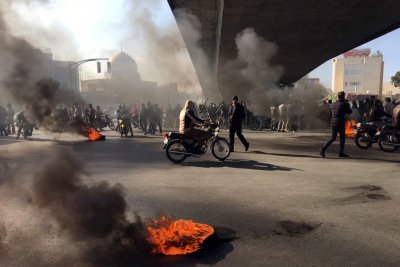Topic: Ali Sistani
Quotes
The new government shall not win popular support unless it proves through practical steps that it sincerely and faithfully aspires towards the accomplishment of the above mentioned missions
Top Iraq cleric still pressing elections Jun 03, 2004
The sons of the Iraqi people demand a political system based on direct elections and a constitution that realizes justice and equality for everyone
Saddam not to be tried until summer Jan 19, 2004
Grand Ayatollah Sayyid Ali al-Husayni al-Sistani Arabic: السيد علي الحسيني السيستاني Persian: سید علی حسینی سیستانی, born approximately August 4, 1930) is the current highest-ranking Shi'a religious scholar in Iraq who lead the Hawza of Najaf. He is a Grand Ayatollah and Twelver Shi'a marja born in Iran and residing in Iraq since 1951. He is currently the preeminent Shi'a cleric for Shia in Iraq and around the world as well as an important political figure in Post-invasion Iraq.
Sistani was born in Mashhad, Iran, to a family of religious scholars. His grandfather, for whom he was named, was a famous scholar who had studied in Najaf. Sistani's family originally comes from Isfahan. During the Safavid period, his forefather Sayyid Mohammad, was appointed as "Shaikhul Islam" (Leading Authority of Islam) by King Hussain in the Sistan province. He traveled to Sistan where he and his children settled the area of Iran known as Sistan, which accounts for the title "al-Sistani" in his great grandson's name today. Sistani began his religious education as a child, beginning in Mashhad, and moving on to study at the Shi'a holy city of Qom in central Iran in 1949. After spending a few years there, in 1951 he went to Iraq to study in Najaf under the late Grand Ayatollah Abu al-Qasim al-Khoei. Sistani rose in religious rank to be named a Marja in 1960 under the military dictatorship of Iraqi president Abd al-Karim Qasim. At the unusually young age of 31 (1961) Ayatullah Sistani reached the senior level of accomplishment called Ijtehad, which entitled him to pass his own judgments on religious questions.
When Khoei died in 1992, Sistani ascended to the rank of Grand Ayatollah by the traditional method - through peer recognition of his scholarship. His role as successor to Khoei was symbolically cemented when he lead the funeral prayers of his widely esteemed teacher and he would go on to inherit Khoei's network and following. With the death of other leading ayatollahs in Iraq including Grand Ayatollah Mohammad Mohammad Sadeq al-Sadr, Sistani emerged as the preeminent Shi'a cleric in Iraq. As the leading Ayatollah in Najaf, Sistani oversees sums amounting to millions of dollars. Sistani's followers offer him a fixed part of their earnings, which he spends for educational and charitable purposes. Sistani's office reports that he supports 35,000 students in Qom, 10,000 in Mashhad, and 4,000 in Isfahan. He also oversees a network of representatives (wakil) "who promote his view in large and small ways in neighborhoods, mosques, bazaars, and seminaries from Kirkuk" to Basra.
It uses material from the Wikipedia article "Ali Sistani."





